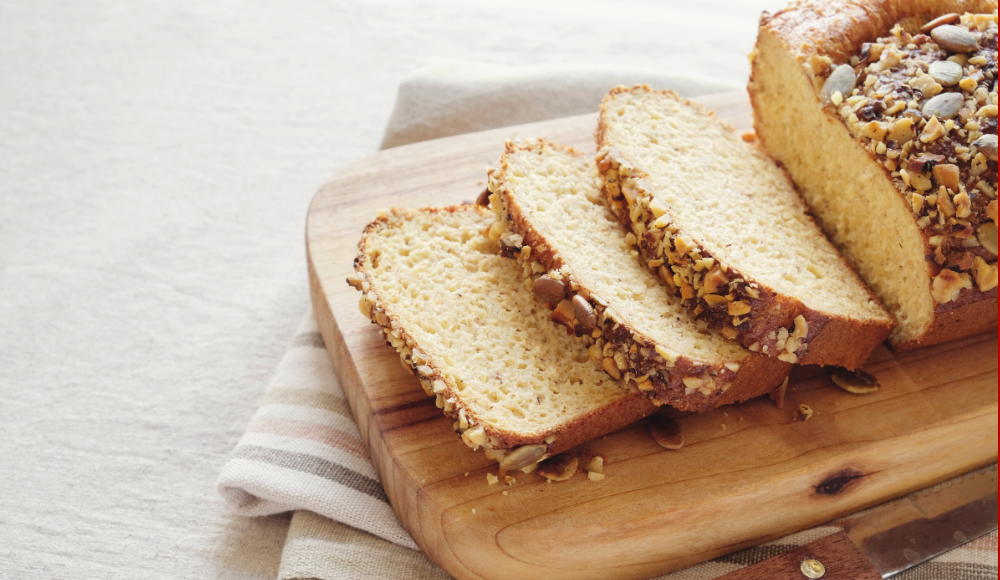There’s the saying “fall down seven times, stand up eight.”
Well, carbohydrates live by that model…
If you take a good look at the history of nutrition and dieting, the carb family has more or less been shoved down, especially over the last decade.
But they’re SO GOOD!
How can we beat on them so much when they taste so good??
I’m here as a proponent for Team Carbs. I’m a #carbsupporter.
Why?
Because the truth is that you really do need carbs, but first we need to break down
WHAT carbs are!
What Are Carbs?
Carbohydrates are found everywhere. They’re in both healthy and unhealthy foods and found in a variety of forms.
Today, carbs are broken down based on their quality. The higher quality being regarded as the healthier sources of carbs are unprocessed or minimally processed and are reveled for their ability to promote good health and deliver proper nutrients. Then, the lower quality unhealthier sources are highly processed and refined and are linked to a number of health consequences.
On a scientific and nutrition level, carbohydrates offer 4 calories per 1 gram. They are divided into the following three categories:
Starch
Starches are one of the most common form of carbs because these include a number of fruits, veggies, beans, lentils, and grains. These are a great source of energy and offer a wide range of nutrients.
- Here are some foods that fall into the starch category:
Peas - Corn
- Lima Beans
- Potatoes
- Dried Beans
- Lentils
- Pinto Beans
- Kidney Beans
- Black Eyed Pea s
- Oats
- Barley
- Rice
- Quinoa
- Pumpkin
- Squash
Fiber
When I found out fiber was a carbohydrate, I was shocked, but alas they are in fact a carb!
Fiber is found only in plant foods as the indigestible portion of a plant. When consumed, fiber passes through the intestines and is NOT digested.
While fiber is not digested, it is known for its contribution to digestion for its ability to make you feel satiated and keep you regular.
Here are some good recommendations for fiber, notice that there is some overlap:
- Black Beans
- Kidney Beans
- Pinto Beans
- Chickpeas
- White Beans
- Lentils
- Apples
- Corn
- Berries
- Whole Wheat Pasta
- Whole Grain Cereal
- Whole Grain Breads
Sugars
When we hate on carbs, we’re most often hating on sugars, but not all sugars are bad.
There are 2 types of sugars:
- Natural – The sugars that occur in fruits and milk
- Added – These are the syrups and sugars added to things like canned fruits, treats, and sweets.
Now that we know WHAT carbohydrates are, I want to share 8 facts about carbs to help you better understand why you need them in your life!
Carbs Are a Fantastic Fuel Source
Our bodies are engines that need a consistent fuel source, and just like your car prefers a specific fuel source, so does your body.
What’s the best and most efficient fuel source?
CARBS!
In order for our body to run and muscles to work, they need glycogen (the broken down form of carbs). Glucose (how carbohydrates are stored inside the muscle cells) is the preferred fuel source.
If you were able to ask your body to choose between fats and carbs as a fuel source, nearly 100% of the time your body will choose carbs. The exception being a long-time practicing ketogenic, and even then, research indicates that if still given the choice of carbs or fats before performance, the body performs better on carbohydrates.
Beyond your muscles, your liver also needs glycogen. The liver is responsible for neurological functions, detoxification, and a number of other important properties. The liver requires glycogen in the form of fructose (another broken down form of glycogen which primarily comes from fruit). The liver doesn’t need much glycogen to fill up its stores because it has a much lower storage rate, so 1 to 2 servings is enough to satisfy the needs of most people.
Carbs Are Full of Nutrients
Carbs have really taken a beating and have been labeled as the source of obesity. Here’s the thing, cutting them out won’t help you much because carbs are packed with nutrients. Carbs contain such a unique source of nutrients including the following:
- Glucose
- Fructose
- Fiber
- Sodium
- Potassium
- Magnesium
- Calcium
- Vitamin C
Each of these nutrients can absolutely be supplemented; however, it’s important to remember that micronutrients are often shuttled to cells via macronutrients so vitamins and minerals are best consumed via whole foods.
In my experience, a balanced approach is most advantageous strategy for getting the optimal amount of nutrients from proteins, fats, and carbs.
Carbs Are More Difficult to Store as Body Fat
The key words here are MORE DIFFICULT because let’s be clear, carbs can be stored as body fat if consumed in improper quantities and types. The reality is that if you consume too many calories from ANY macronutrient, you will gain body fat.
BUT, there is evidence that indicates carbs are more difficult to store as body fat.
Carbs are considered a non-essential nutrient, meaning it is possible to live without them, but if your life involves performance, high intensity activity, or muscle building, my experience shows carbs are necessary.
When it comes to the storage of nutrients, your body prefers to store fats before carbs.
Fats are beneficial for hormone production, neurological function, and body fuel during low intensity activity. Unlike carbs, fats are an essential nutrient, which means the body prefers these for storage for day-to-day body functioning.
Because fats are prioritized for storage, carbs are not needed for storage unless fat consumption reaches a low level. The body prefers carbs as a fuel source, which means they are burned off during activity.
Regardless of how fats and carbs are utilized within the body, there’s an important thing to remember – if you’re in a caloric surplus, regardless the amount of each macronutrient, your body will begin to store food as body fat. During training, carbohydrates are prioritized as fuel for training and fats will remain as a source for storage.
Carbs Boost Muscle Growth
Whether you’re losing weight or building strength, a portion of that goal is to build muscle.
Carbs are a protein-sparing nutrient, which means that in the absence of protein, your body will utilize carbs to help conserve muscle tissue.
If your goal is fat loss and you’re on a diet, then carbs are really important for your body.
Your body’s operating on less nutrients and is essentially operating in survival mode.
Your body is deprived of fuel and as a result not optimally functioning. In this situation,
your body is forced to used what is stored, and if your macronutrients are not on point, it can result in the loss of muscle tissue.
Now, beyond carbs being a protein-sparing nutrient, they are a heavy contributor on a cellular level in the muscle building process.
Carbs assist in the production and activation of ATP (the true fuel source for your muscles). The majority (80%) of ATP is produced through the glucose production process known as glycolysis. ATP is a heavy contributor to anaerobic training, big part of building muscle and strength. This means that strength or high-intensity training requires carbohydrates for fuel.
Carbs Reduce Stress
Now, I, like so many others, fall victim to stress eating and typically those foods are carbs; however, that’s not how I mean carbs reduce stress.
When you consume carbs, your insulin levels spike, and when that happens, cortisol levels are blunted.
This is a positive at the right time.
If you constantly spike your cortisol levels with stress or food or do so at the wrong times, you’re in for some trouble.
But when done at the right times (when you wake up or prior to a workout) you’re going to feel more energized, physically prepared, and mentally alert.
Now because carbs can help us control and lower your stress response, there’s a tool to assist in lowering stress levels and improve recovery.
If your body stays stressed and in Fight or Flight mode, your body is missing out on the Rest & Digest (parasympathetic) phase, which leads to stress overload. Your body WANTS to recover from stress, and when its not allowed to your body begins to breakdown in a number of ways.
In summary, eat your carbs to prevent and manage stress, not to cope with it.
Carbs Enhance Hormonal Output
Fats are known for their contribution to hormonal health, and because of their contribution, people typically neglect the impact of carbohydrates on hormonal health.
Carbs significantly impact thyroid health, and the thyroid impacts nearly every human cell and hormone in the body. Specifically, carbs contribute to the conversion of T4 to T3 and maintaining the appropriate levels of insulin, cortisol, and testosterone.
If you don’t know too much about these hormones, here’s a little breakdown of each:
- T4 is the thyroids storage hormone, which must be converted to its active form, T3.
- T3 is the energy hormone because once T4 is converted to T3 it can give energy to every cell in the body.
- Insulin helps to manage the storage and management of nutrients. Training improves our insulin sensitivity (ability to better shuttle nutrients throughout the body).
- Cortisol is the stress hormone and directly impacts insulin.
- Testosterone is particularly important for men for its contribution to focus, motivation, muscle mass, and reproduction.
Carbs Aid Sleep Patterns
We already talked through how carbs contribute to lowering stress levels, and because of this its been suggested that carb consumption before bed can help us unwind and get more restful sleep.
Carbs can help trigger serotonin (the neurotransmitter proven to enhance mood and improve sleep quality).
Carbs drive the shift into Rest & Digest (parasympathetic) mode, which encourages good sleep.
Most of us try to go to bed wired because cortisol levels remain elevated and we never leave the sympathetic state. This can really screw up our circadian rhythm. One of the best ways to help this from a nutritional standpoint is to regularly consume carbs and help drive you into a parasympathetic state.
Carbs Are Inevitable
The last thing to note about carbs is that they’re darn near inevitable.
If you’re on that edge and contemplating a ketogenic diet, it’s important to know how hard it is to completely eliminate carbs.
I don’t know about you, but I can’t imagine never having ice cream, popcorn, or pizza again. Oh, and I don’t drink booze, but there’s that to consider too….
Wait, don’t forget fruit and starchy veggies.
Now, I’m not saying a ketogenic diet doesn’t work for some. In fact, I have some clients who it works great for, but they do have their days or weekends where they bring carb consumption back up to live a more normal life for a couple of days.
It’s something to consider if you really want to check labels and give up your favorite foods forever.
Convinced?
Whether you are or not, take a look at how to more easily consume high quality sources of carbs in your day:
- Eat 1-2 Servings of Fruit
- Eat Veggies at Every Meal
- Start the Day with a Whole Grain
- Pre-Plan Your Carbs
- Look Beyond the Bread Aisle
Look my best recommendation is to follow the diet that works best for your lifestyle, regardless of it that contains carbs.
The point of this blog was to shine light on the benefits of carbs since they get quite the bad rep these days.
Use this article for education and to find the appropriate balance for carbs in your life.
About The Author

Jordan Davies is the Co-Owner of Complete Performance. Jordan has her B.S. in Exercise Science and Psychology, and her M.A. in Holistic Health Studies. She is a CSCS certified strength and conditioning coach, and a PN-1 and NCI-1 certified nutrition coach. She loves to study how the human body needs to be moved and nourished and making that fit to your unique lifestyle. Click Here Now to Apply for Coaching with Jordan.





